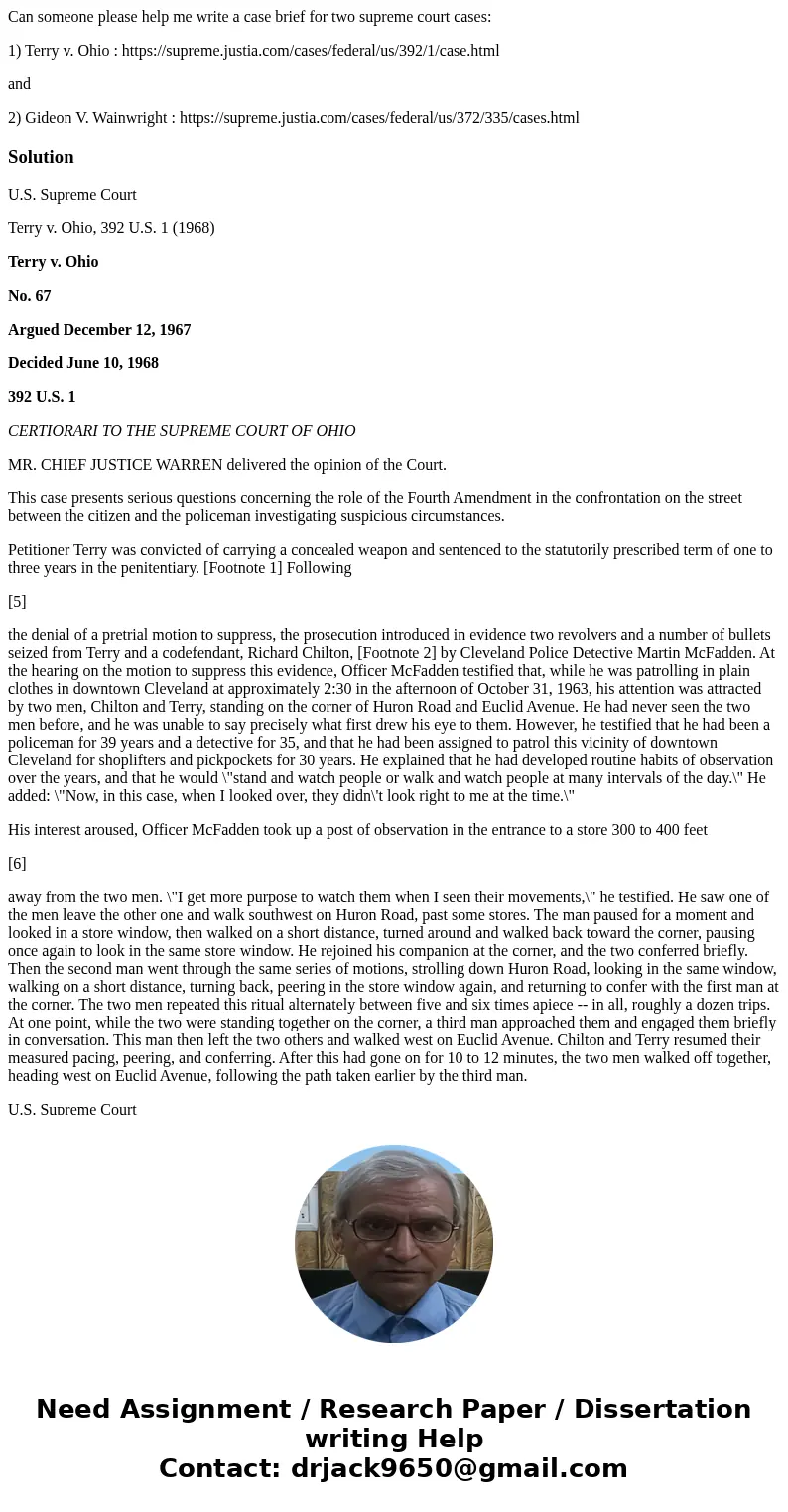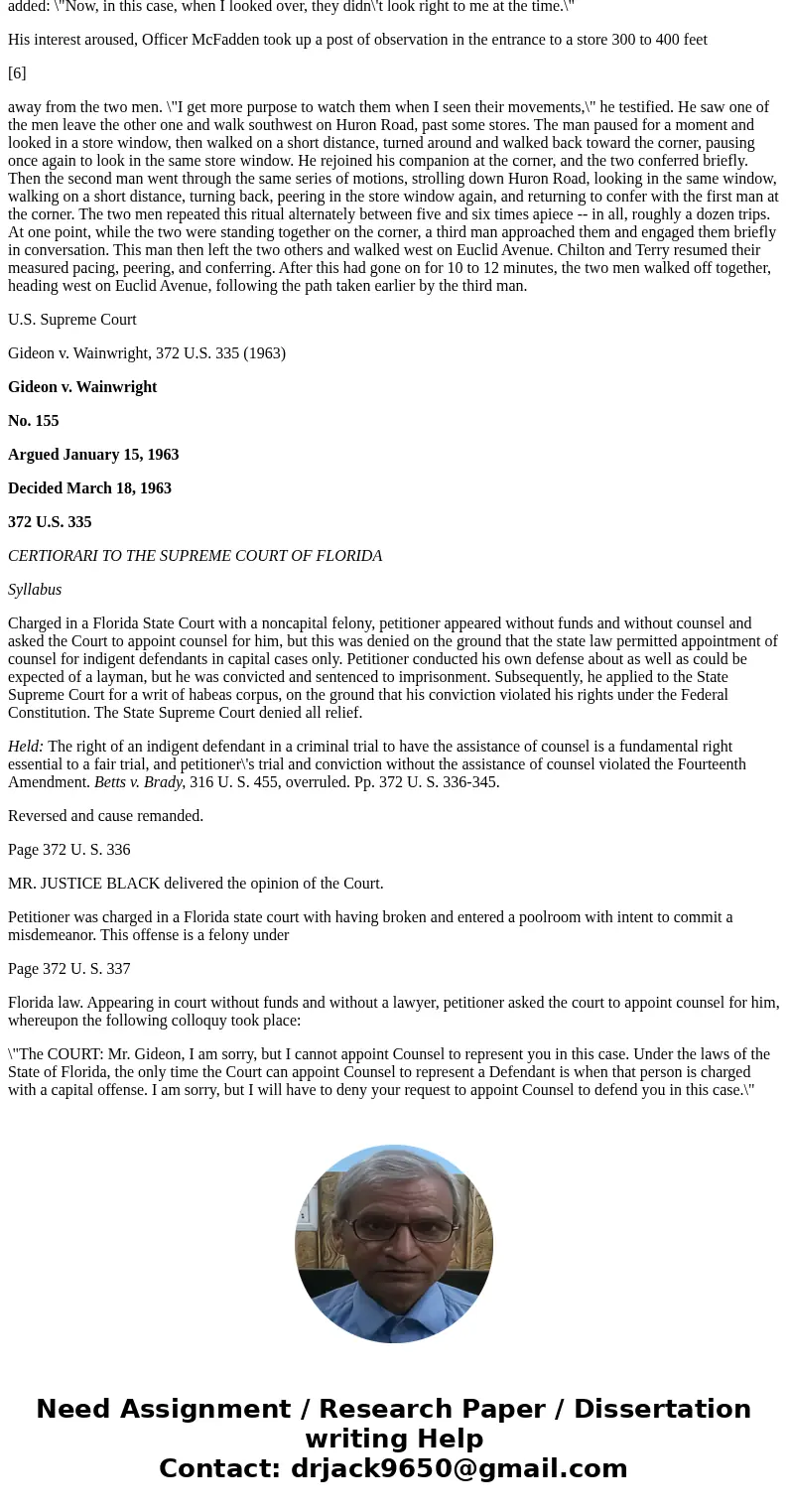Can someone please help me write a case brief for two suprem
Can someone please help me write a case brief for two supreme court cases:
1) Terry v. Ohio : https://supreme.justia.com/cases/federal/us/392/1/case.html
and
2) Gideon V. Wainwright : https://supreme.justia.com/cases/federal/us/372/335/cases.html
Solution
U.S. Supreme Court
Terry v. Ohio, 392 U.S. 1 (1968)
Terry v. Ohio
No. 67
Argued December 12, 1967
Decided June 10, 1968
392 U.S. 1
CERTIORARI TO THE SUPREME COURT OF OHIO
MR. CHIEF JUSTICE WARREN delivered the opinion of the Court.
This case presents serious questions concerning the role of the Fourth Amendment in the confrontation on the street between the citizen and the policeman investigating suspicious circumstances.
Petitioner Terry was convicted of carrying a concealed weapon and sentenced to the statutorily prescribed term of one to three years in the penitentiary. [Footnote 1] Following
[5]
the denial of a pretrial motion to suppress, the prosecution introduced in evidence two revolvers and a number of bullets seized from Terry and a codefendant, Richard Chilton, [Footnote 2] by Cleveland Police Detective Martin McFadden. At the hearing on the motion to suppress this evidence, Officer McFadden testified that, while he was patrolling in plain clothes in downtown Cleveland at approximately 2:30 in the afternoon of October 31, 1963, his attention was attracted by two men, Chilton and Terry, standing on the corner of Huron Road and Euclid Avenue. He had never seen the two men before, and he was unable to say precisely what first drew his eye to them. However, he testified that he had been a policeman for 39 years and a detective for 35, and that he had been assigned to patrol this vicinity of downtown Cleveland for shoplifters and pickpockets for 30 years. He explained that he had developed routine habits of observation over the years, and that he would \"stand and watch people or walk and watch people at many intervals of the day.\" He added: \"Now, in this case, when I looked over, they didn\'t look right to me at the time.\"
His interest aroused, Officer McFadden took up a post of observation in the entrance to a store 300 to 400 feet
[6]
away from the two men. \"I get more purpose to watch them when I seen their movements,\" he testified. He saw one of the men leave the other one and walk southwest on Huron Road, past some stores. The man paused for a moment and looked in a store window, then walked on a short distance, turned around and walked back toward the corner, pausing once again to look in the same store window. He rejoined his companion at the corner, and the two conferred briefly. Then the second man went through the same series of motions, strolling down Huron Road, looking in the same window, walking on a short distance, turning back, peering in the store window again, and returning to confer with the first man at the corner. The two men repeated this ritual alternately between five and six times apiece -- in all, roughly a dozen trips. At one point, while the two were standing together on the corner, a third man approached them and engaged them briefly in conversation. This man then left the two others and walked west on Euclid Avenue. Chilton and Terry resumed their measured pacing, peering, and conferring. After this had gone on for 10 to 12 minutes, the two men walked off together, heading west on Euclid Avenue, following the path taken earlier by the third man.
U.S. Supreme Court
Gideon v. Wainwright, 372 U.S. 335 (1963)
Gideon v. Wainwright
No. 155
Argued January 15, 1963
Decided March 18, 1963
372 U.S. 335
CERTIORARI TO THE SUPREME COURT OF FLORIDA
Syllabus
Charged in a Florida State Court with a noncapital felony, petitioner appeared without funds and without counsel and asked the Court to appoint counsel for him, but this was denied on the ground that the state law permitted appointment of counsel for indigent defendants in capital cases only. Petitioner conducted his own defense about as well as could be expected of a layman, but he was convicted and sentenced to imprisonment. Subsequently, he applied to the State Supreme Court for a writ of habeas corpus, on the ground that his conviction violated his rights under the Federal Constitution. The State Supreme Court denied all relief.
Held: The right of an indigent defendant in a criminal trial to have the assistance of counsel is a fundamental right essential to a fair trial, and petitioner\'s trial and conviction without the assistance of counsel violated the Fourteenth Amendment. Betts v. Brady, 316 U. S. 455, overruled. Pp. 372 U. S. 336-345.
Reversed and cause remanded.
Page 372 U. S. 336
MR. JUSTICE BLACK delivered the opinion of the Court.
Petitioner was charged in a Florida state court with having broken and entered a poolroom with intent to commit a misdemeanor. This offense is a felony under
Page 372 U. S. 337
Florida law. Appearing in court without funds and without a lawyer, petitioner asked the court to appoint counsel for him, whereupon the following colloquy took place:
\"The COURT: Mr. Gideon, I am sorry, but I cannot appoint Counsel to represent you in this case. Under the laws of the State of Florida, the only time the Court can appoint Counsel to represent a Defendant is when that person is charged with a capital offense. I am sorry, but I will have to deny your request to appoint Counsel to defend you in this case.\"


 Homework Sourse
Homework Sourse